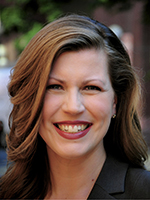






The International Center for Law and Religion Studies is honored to announce that two distinguished legal professionals have accepted appointments as Senior Fellow, Australia barrister Neville Rochow SC and American advocate Hannah Clayson Smith.
Hannah Smith brings an unparalleled interest in and a distinguished record of service to the core issues of religious liberty in the United States. She twice clerked at the US Supreme Court, for Justices Clarence Thomas and Samuel A. Alito, Jr., and between clerkships was an associate in private practice at national law firms in Washington D.C., representing clients before state and federal courts and the U.S. Supreme Court in civil, criminal, and constitutional cases. Most recently she served as Senior Counsel at Becket Law, where she helped secure victories in key U.S. Supreme Court religious liberty cases, including Hosanna-Tabor Evangelical Lutheran Church and School v. EEOC, Holt v. Hobbs, Burwell v. Hobby Lobby, and Zubik v. Burwell (the "Little Sisters of the Poor" case). She has contributed to 25 Supreme Court briefs and represented more than 13 major faith groups including Anglicans, Assemblies of God, Baptists, Catholics, Hindus, Hutterites, Jews, Lutherans, Mormons, Muslims, Russian Orthodox, Santeros, and Sikhs. Hannah received her BA from Princeton University and her juris doctorate from BYU Law School, where she was elected to the Order of the Coif, served as Executive Editor of the BYU Law Review, and was one of the founding-era research assistants for the ICLRS. BYU awarded her its Alumni Achievement Award in 2013, and the J. Reuben Clark Law Society presented her with its Women-in-Law Leadership Award in 2016. In 2017, she delivered the G. Homer Durham Lecture, speaking on the topic "Religious Liberty: The Promise of American Religious Pluralism."
Neville Rochow SC holds adjunct professorships at the law schools of Notre Dame Australia and the University of Adelaide. His research interests include jurisprudence, human rights, and freedom of religion or belief. He works with Professor Paul Babie on the Law and Religion Project of the Research Unit for the Study of Society, Ethics and Law, the University of Adelaide. In his practice as a Silk (Senior Counsel, equivalent to UK Queen's Counsel) from Howard Zelling Chambers, he had a national practice in corporate, commercial, competition, and constitutional law. He has appeared in the High Court of Australia, the Federal Court, the Supreme Court of various States and other federal, territorial, and state jurisdictions. From 2015 to 2017, Neville and his wife, Penny, served as Government Relations Representative at the European Union Office of The Church of Jesus Christ of Latter-day Saints in Brussels, Belgium, acting as advisers and advocates in the EU and the UK on freedoms of religion, belief, conscience, and expression. Neville graduated LLB (Hons) from the University of Adelaide Law School and was subsequently conferred a Master of Laws degree from Adelaide for a thesis on constitutional law and fact ascertainment. He also has a Master of Laws degree from Deakin University in competition law. He is completing a PhD by publication at Adelaide Law School, the dissertation for which will collate and provide a narrative on works he has published in recent years on freedom of religion or belief in Australia and the desirability of the domestic incorporation of international human rights norms.
